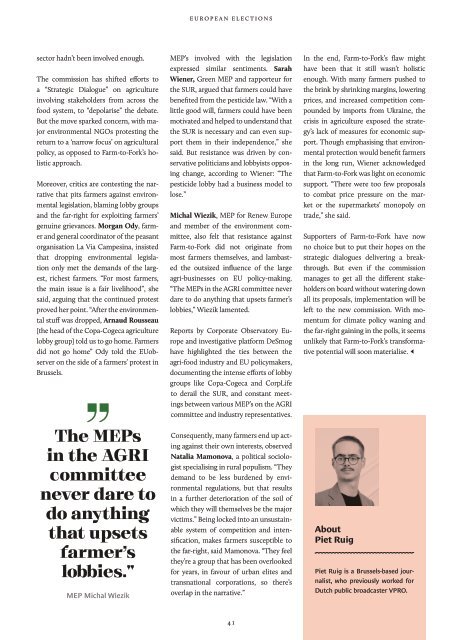EU Elections
EUobserver's guide to the 2024 European Parliament Elections.
EUobserver's guide to the 2024 European Parliament Elections.
- No tags were found...
Create successful ePaper yourself
Turn your PDF publications into a flip-book with our unique Google optimized e-Paper software.
<strong>EU</strong>ROPEAN ELECTIONS<br />
sector hadn’t been involved enough.<br />
The commission has shifted efforts to<br />
a “Strategic Dialogue” on agriculture<br />
involving stakeholders from across the<br />
food system, to “depolarise” the debate.<br />
But the move sparked concern, with major<br />
environmental NGOs protesting the<br />
return to a ‘narrow focus’ on agricultural<br />
policy, as opposed to Farm-to-Fork’s holistic<br />
approach.<br />
Moreover, critics are contesting the narrative<br />
that pits farmers against environmental<br />
legislation, blaming lobby groups<br />
and the far-right for exploiting farmers’<br />
genuine grievances. Morgan Ody, farmer<br />
and general coordinator of the peasant<br />
organisation La Via Campesina, insisted<br />
that dropping environmental legislation<br />
only met the demands of the largest,<br />
richest farmers. “For most farmers,<br />
the main issue is a fair livelihood”, she<br />
said, arguing that the continued protest<br />
proved her point. “After the environmental<br />
stuff was dropped, Arnaud Rousseau<br />
[the head of the Copa-Cogeca agriculture<br />
lobby group] told us to go home. Farmers<br />
did not go home” Ody told the <strong>EU</strong>observer<br />
on the side of a farmers’ protest in<br />
Brussels.<br />
The MEPs<br />
in the AGRI<br />
committee<br />
never dare to<br />
do anything<br />
that upsets<br />
farmer’s<br />
lobbies."<br />
MEP Michal Wiezik<br />
MEP’s involved with the legislation<br />
expressed similar sentiments. Sarah<br />
Wiener, Green MEP and rapporteur for<br />
the SUR, argued that farmers could have<br />
benefited from the pesticide law. “With a<br />
little good will, farmers could have been<br />
motivated and helped to understand that<br />
the SUR is necessary and can even support<br />
them in their independence,” she<br />
said. But resistance was driven by conservative<br />
politicians and lobbyists opposing<br />
change, according to Wiener: “The<br />
pesticide lobby had a business model to<br />
lose.”<br />
Michal Wiezik, MEP for Renew Europe<br />
and member of the environment committee,<br />
also felt that resistance against<br />
Farm-to-Fork did not originate from<br />
most farmers themselves, and lambasted<br />
the outsized influence of the large<br />
agri-businesses on <strong>EU</strong> policy-making.<br />
“The MEPs in the AGRI committee never<br />
dare to do anything that upsets farmer’s<br />
lobbies,” Wiezik lamented.<br />
Reports by Corporate Observatory Europe<br />
and investigative platform DeSmog<br />
have highlighted the ties between the<br />
agri-food industry and <strong>EU</strong> policymakers,<br />
documenting the intense efforts of lobby<br />
groups like Copa-Cogeca and CorpLife<br />
to derail the SUR, and constant meetings<br />
between various MEP’s on the AGRI<br />
committee and industry representatives.<br />
Consequently, many farmers end up acting<br />
against their own interests, observed<br />
Natalia Mamonova, a political sociologist<br />
specialising in rural populism. “They<br />
demand to be less burdened by environmental<br />
regulations, but that results<br />
in a further deterioration of the soil of<br />
which they will themselves be the major<br />
victims.” Being locked into an unsustainable<br />
system of competition and intensification,<br />
makes farmers susceptible to<br />
the far-right, said Mamonova. “They feel<br />
they’re a group that has been overlooked<br />
for years, in favour of urban elites and<br />
transnational corporations, so there’s<br />
overlap in the narrative.”<br />
In the end, Farm-to-Fork’s flaw might<br />
have been that it still wasn’t holistic<br />
enough. With many farmers pushed to<br />
the brink by shrinking margins, lowering<br />
prices, and increased competition compounded<br />
by imports from Ukraine, the<br />
crisis in agriculture exposed the strategy’s<br />
lack of measures for economic support.<br />
Though emphasising that environmental<br />
protection would benefit farmers<br />
in the long run, Wiener acknowledged<br />
that Farm-to-Fork was light on economic<br />
support. “There were too few proposals<br />
to combat price pressure on the market<br />
or the supermarkets’ monopoly on<br />
trade,” she said.<br />
Supporters of Farm-to-Fork have now<br />
no choice but to put their hopes on the<br />
strategic dialogues delivering a breakthrough.<br />
But even if the commission<br />
manages to get all the different stakeholders<br />
on board without watering down<br />
all its proposals, implementation will be<br />
left to the new commission. With momentum<br />
for climate policy waning and<br />
the far-right gaining in the polls, it seems<br />
unlikely that Farm-to-Fork’s transformative<br />
potential will soon materialise. ◄<br />
About<br />
Piet Ruig<br />
Piet Ruig is a Brussels-based journalist,<br />
who previously worked for<br />
Dutch public broadcaster VPRO.<br />
41

















